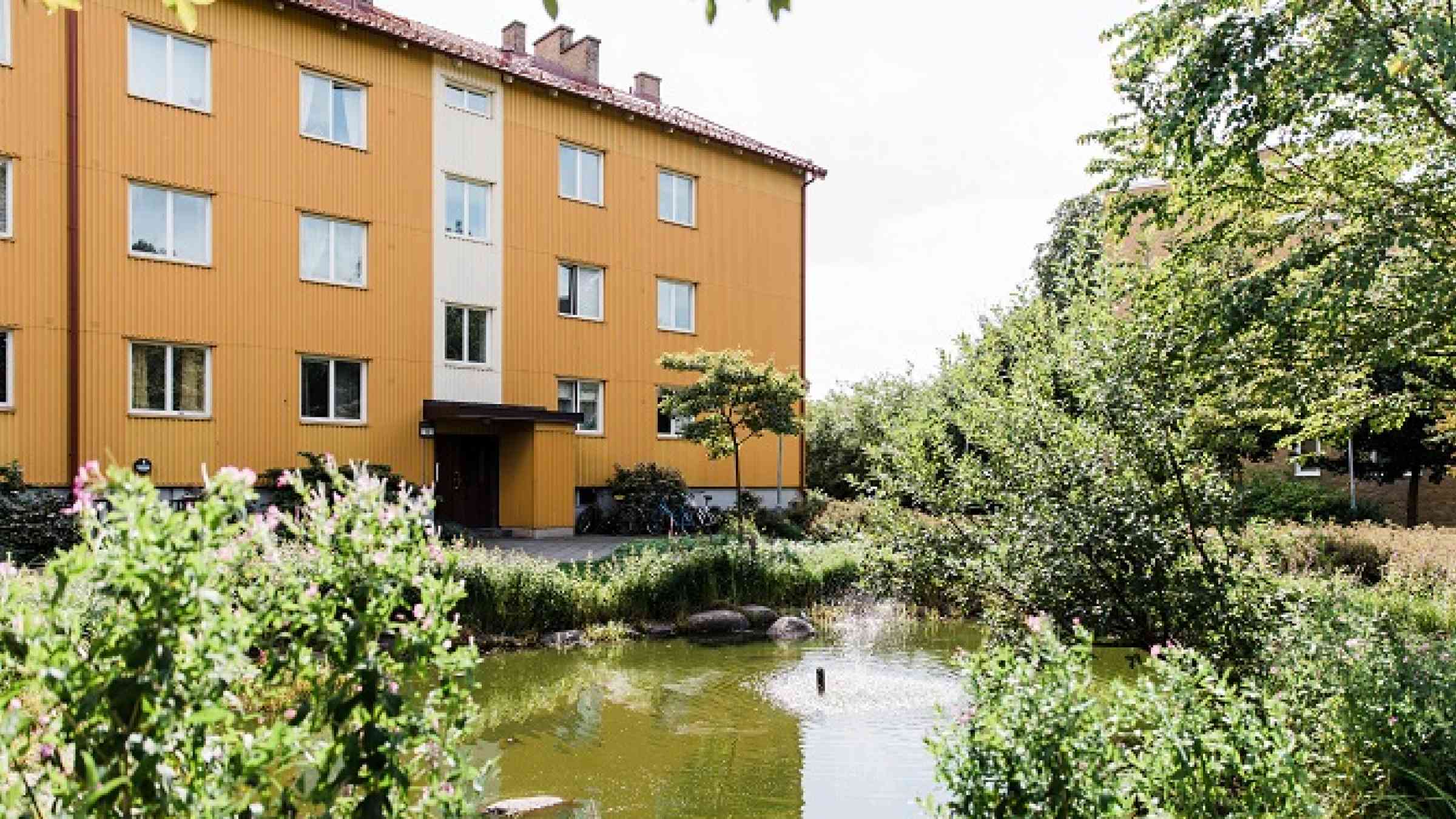Green signals 'go' for Malmö’s urban regeneration

The third feature in this Making Cities Resilient 2030 series, under the theme ‘From Risk to Resilience: Building a Local Climate of Success’, profiles Malmö, in Sweden
The transformation of Augustenborg residential area from a flood-prone area of social and economic decline to a more inclusive, safe, resilient, and sustainable part of the city is a living symbol of Malmö’s innovative and sustainable urban development ambitions. The 4-year regeneration programme has curtailed major flood problems and increased multi-functional green spaces in the district, making it a more attractive place to live.
Rainwater is now channeled from roofs, roads, and car parks through a network of trenches, ditches, ponds, and wetlands, with only the surplus being directed into a conventional sewer system. A network of 6km of water channels and 10 retention ponds protects Augustenborg. Another key element of the urban regeneration is the installation of green roofs on all new developments and the retrofitting of more than 11,000 m2 of rooftops on existing buildings.
The regeneration of Augustenborg is a vivid reflection of Malmö’s long-standing commitment to a vision of climate resilient and sustainable urban development. Malmö’s Comprehensive Plan drives the long-term strategy for the city. It was the first in Sweden to publicly commit to implement the Sustainable Development Goals and last year was named the country’s most environmentally friendly municipality. This ambition rests on three pillars: to be a socially, environmentally, and economically sustainable city that is an attractive place to live. The city follows three guiding principles in support: resource efficiency, environmental robustness, and a dynamic, diverse, and responsible local economy. These combine to protect the wellbeing of future generations. And it is an approach that seems to be working, challenges notwithstanding.
Malmö is home to 350,000 citizens representing over 180 different nationalities. Almost half are under the age of 35. The city is evolving from its industrial past into a thriving commercial centre in the south of Sweden. Malmö is already embracing the need for action now rather than tomorrow. It has implemented steps to cut energy use in city-owned buildings by 30 per cent. This is only the start: “We plan to make the entire city run on renewable energy by 2030," said the Mayor of Malmö, Ms Katrin Stjernfeldt Jammeh. “Now is the time to strengthen our climate adaptation and resilience to meet challenges ahead and seize the opportunities.”
In the Western Harbour district, the city is using a mix of private and public funding – both national and European Union-sourced – to implement green roofs, green areas, and stormwater management measures. Using a partnership approach, the city is engaging private developers to construct projects that reflect and support Malmö’s overall vision for sustainable development. If needed, the local authority applies for additional public funding for extra environmental measures so that projects reach an even higher level of resilience. The transformation of the area continues.
Another major development in Malmö is that of the Hyllie area, which has become a testing ground for sustainability founded upon the use of renewable electricity and smart planning. The ‘Hyllie Climate Contract’ formed a partnership between public and private entities committed to renewable and recycled energy. New infrastructure has provided greener services in terms of travel and retail. Hyllie subway station has been designed to reduce the sense of being underground with light from the 52 skylights reaching below. Meanwhile, the Emporia shopping centre has a park on its rooftop to help manage stormwater. The roof is accessible for shoppers to enjoy. Protecting such innovative urban development from the threat of rising sea levels is of utmost importance for a coastal city such as Malmö. With this in mind, Malmö has completed a spatial coastal protection analysis as the first step to develop a coastal protection strategy in 2023.
With such a strong track record within its own municipal boundaries, Malmö is also committed to continue its international leadership on climate resilience and sustainable development. In May 2022, the city hosted the Local Governments for Sustainable Development (ICLEI) World Congress, under the theme ‘Strategies towards resilient and healthy cities’. Local and regional governments from around the world gathered to share experience on how they are advancing their respective resilience agendas. In terms of becoming an MCR2030 Resilience Hub, one of Malmö’s principal motivations is to inspire and support Nordic Blue-Green Solutions and climate adaptation in the Baltic Sea Region. As a coastal city, Malmö will continue to use MCR2030 as a platform to share, develop, and implement climate actions to reduce the risk from sea-level rise, storms, cloudbursts, and heatwaves.

